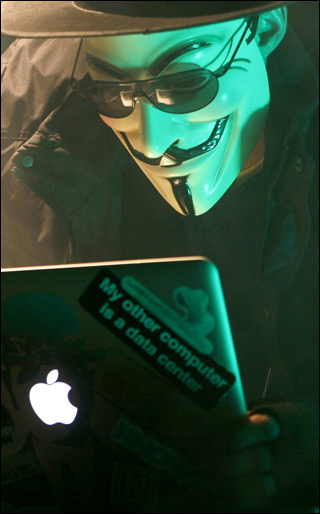
Detail of the photograph "Anonymous Hacker." (Original photograph by Brian Klug on flickr.)
Instructor(s)
Marcella Therese Szablewicz
MIT Course Number
CMS.S60 / CMS.S96
As Taught In
Spring 2013
Level
Undergraduate / Graduate
Course Description
Course Features
Course Description
Hacking and trolling; mass murders and bullying. What do these have in common? One theory holds that these are all "deviant" social behaviors, occurring both online and off, which have purportedly been brought about or exacerbated by our new media environment. Such aberrant behaviors seemingly give us ample reason to fear digital and social media. But is technology to blame? We will grapple with this question as we investigate how our understanding of new technologies and media is socially shaped and, in turn, how new media might influence our social behavior.
We will begin by studying how similar panics about "old" media (books, film, television and even the written word itself) set historical precedents for these current fears. Along the way we will establish and explore issues embedded in debates about new media, including questions of class, gender, youth, sex, and violence. Such topics will be placed in cross-cultural perspective, allowing us to compare the nature of panics over contemporary events and issues—e.g. the Columbine school shootings, cyber-bullying, Japanese otaku, and the Chinese "Human Flesh Search Engine"—occurring within both the United States and East Asia. Students will read essays, keep media journals and watch films pertaining to weekly topics.


